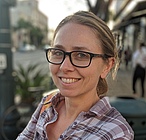Seminar: R and teamwork for better science in less time
|
Contents
ONLINE-SEMINAR - You will be receiving the link to the virtual conference room in the week before the talk.
R has demonstrable potential to accelerate scientific research, since it not only provides powerful analytical tools that increase reproducibility but also creates a new frontier for communication when combined with the open web. But thus far, the power of R have largely been harnessed by individuals; how do we harness this power as teams in science, within and beyond the research group? I will discuss how our Ocean Health Index team dramatically improved how we work by creating an analytical workflow with R – and by peer-learning and peer-teaching the skillsets we needed on-the-job by engaging with the broader #rstats and #openscience communities (Lowndes et al. 2017 Nature Ecology & Evolution; ohi-science.org).
I will also discuss Openscapes, which I developed as a Mozilla Fellow: Openscapes is a mentorship program to engage and empower science teams with open data science tools and practices (Lowndes et al. 2019, Nature; openscapes.org). My work aims to help catalyze the fundamental shift needed in scientific culture where we value and prioritize data science, collaboration, and open practices, and provide training and support for our emerging scientific leaders – not only as individuals, but as teams.
The course is open to all iDiv scientists.
Lecturer

is a marine ecologist, data scientist, and Senior Fellow at the National Center for Ecological Analysis and Synthesis (NCEAS). As founding director of Openscapes (created as a Mozilla Fellow in 2019) and science program lead of the Ocean Health Index, she works to increase the value and practice of environmental open data science. She is also a co-founder of Eco-Data-Science and R-Ladies Santa Barbara, and is a Carpentries instructor. She earned her PhD at Stanford University in 2012 studying drivers and impacts of Humboldt squid in a changing climate.
